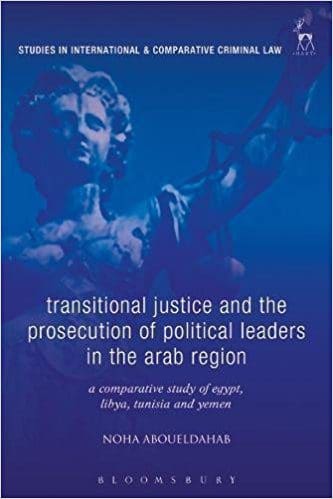By: Noha Aboueldahab
 The dramatic uprisings that ousted the long-standing leaders of several countries in the Arab region set in motion an unprecedented period of social, political and legal transformation. The prosecution of political leaders took centre stage in the pursuit of transitional justice following the ‘Arab Spring’. Through a comparative case study of Egypt, Libya, Tunisia and Yemen, this book argues that transitional justice in the Arab region presents the strongest challenge yet to the transitional justice paradigm. This paradigm is built on the underlying assumption that transitions constitute a shift from non-liberal to liberal democratic regimes, where often legal measures are taken to address atrocities committed during the prior regime. The book is guided by two principal questions: first, what trigger and driving factors led to the decision of whether or not to prosecute former political leaders? And second, what shaping factors affected the content and extent of decisions regarding prosecution? In answering these questions, the book enhances our understanding of how transitional justice is pursued by different actors in varied contexts. In doing so, it challenges the predominant understanding that transitional justice uniformly occurs in liberalising contexts and calls for a re-thinking of transitional justice theory and practice.
The dramatic uprisings that ousted the long-standing leaders of several countries in the Arab region set in motion an unprecedented period of social, political and legal transformation. The prosecution of political leaders took centre stage in the pursuit of transitional justice following the ‘Arab Spring’. Through a comparative case study of Egypt, Libya, Tunisia and Yemen, this book argues that transitional justice in the Arab region presents the strongest challenge yet to the transitional justice paradigm. This paradigm is built on the underlying assumption that transitions constitute a shift from non-liberal to liberal democratic regimes, where often legal measures are taken to address atrocities committed during the prior regime. The book is guided by two principal questions: first, what trigger and driving factors led to the decision of whether or not to prosecute former political leaders? And second, what shaping factors affected the content and extent of decisions regarding prosecution? In answering these questions, the book enhances our understanding of how transitional justice is pursued by different actors in varied contexts. In doing so, it challenges the predominant understanding that transitional justice uniformly occurs in liberalising contexts and calls for a re-thinking of transitional justice theory and practice.
Using original findings generated from almost 50 interviews across 4 countries, this research builds on the growing critical literature that claims that transitional justice is an under-theorised field and needs to be developed to take into account non-liberal and complex transitions. It will be stimulating and thought-provoking reading for all those interested in transitional justice and the ‘Arab Spring’.
‘Beginning with the striking image of former Egyptian President Hosni Mubarak in the docks in 2011, Aboueldahab analyzes the role of transitional justice processes in relation to the political developments of the Arab Spring. She makes a compelling case for a fundamental rethinking of those approaches to fighting impunity that have become mainstreamed in the international human rights community; this book also challenges assumptions and theories regarding the notion of ‘liberalizing’ political transitions. Drawing from four country contexts (Egypt, Tunisia, Libya and Yemen) this book demonstrates that human rights goals were undermined because the international community and key national actors ignored the socio-legal histories that shaped the paths and horizons of political change. This book is an important contribution to the study of international criminal law, transitional justice, and the broader field of political transition.’
Purchase the book in hardcover »
